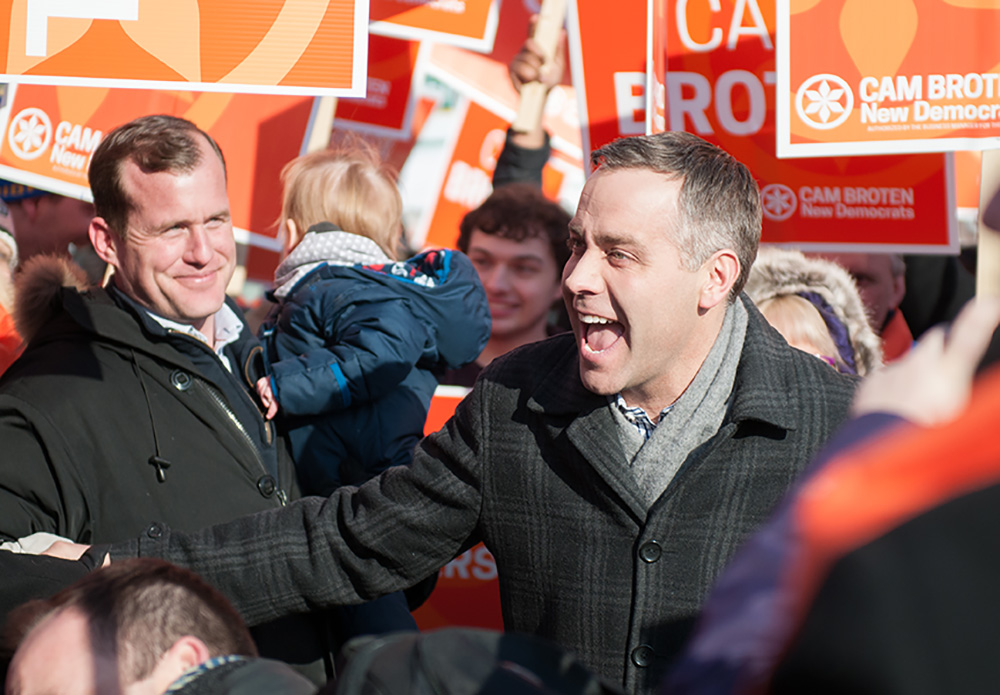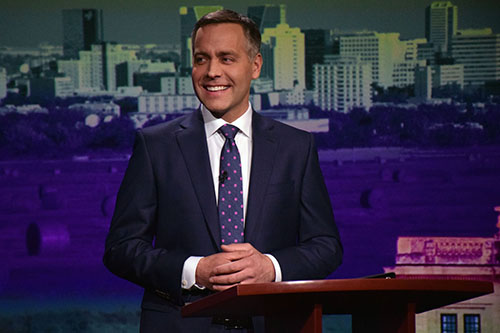Backgrounder by Emily Pasiuk
If you’re new to the province and you bring up the Progressive Conservative Party of Saskatchewan you might get either a scoff or an understanding smile that seems to say, "You don’t know the half of it." Most people just seem to know the discourse surrounding the PCs is tense and coloured with scandal; it’s as though it were an integral part of being Saskatchewanian.
The signs for this year’s provincial election are mostly green or orange in and around the city. Every once and a while, though, a blue sign will pop up. "Progressive Conservative Party of Saskatchewan" it reads, displayed proudly beside one of the two candidate’s names. In the last provincial election, there were five PC candidates. This time around, there are 18.
In Regina, only one PC candidate ran for a seat in 2011, but. this year there are two – Desmond Bilsky for Regina-Pasqua and Allen Mryglod for Regina-Wascana Plains. The question is: Could the Progressive Conservative Party of Saskatchewan rise again?
To answer that, one must first trace the trajectory of the PCs in Saskatchewan. The party’s roots are as old as the province, but it never achieved power outside of a coalition government until the early 1980’s with Grant Devine at the helm. Having grown tired of the stagnancy in the NDP government under Allan Blakeney, Devine utilised right-wing populism to appeal to voters and captured the premier’s spot in 1982 with 54.1 per cent of the vote and 55 out of 64 seats.
Why did the people of Saskatchewan trust Devine? "He offered hope," said Murry Mandryk, political columnist for the Leader-Post. "The 1982 campaign platform was literally titled: ‘There’s so much more we can be.’ And the sad part about the whole Devine legacy is that it completely ruined what should be a forever motto for this province, because this province has always been about ‘there’s so much more we could be,’ whether it’s more than just an agriculture province or more than just a resource-based province or more than a place in the middle of nowhere that everybody leaves for a better place elsewhere," Mandryk said.
"He really tapped in to a long-held sentiment of Saskatchewan people who wanted to be more, but just kept seeing their kids leave to Alberta at that particular time, or B.C. or wherever."
Devine’s PCs ushered in an era of deficit budgets and a fiscal crisis. After 1986, the privatization of Crown corporations such as SaskMinerals and Potash Corp. helped Devine for a short time pay for promises like guaranteed mortgage rates. Devine also sought to eradicate socialist relics left behind from the long reign of the NDP by minimizing social programs, shutting down the Land Bank and seeking to reduce the power of unions. Nevertheless, by the end of his run as premier, Devine and his party had racked up a cumulative debt of over $15 billion, according the Encyclopaedia of Saskatchewan.
In addition to the debt crisis, the PCs in Saskatchewan were embroiled in a fraud scandal that resulted in 12 criminal charges. This forever tainted their reputation in the province, especially because it wasn’t discovered until years after the Devine government had left office.
"It became not only the biggest scandal in Saskatchewan history, politically speaking, but one of the bigger political scandals in Canadian history because so many were criminally charged," Mandryk said.
This collapse eventually gave rise to the Saskatchewan Party, when the ruined Liberals and Conservative parties joined forces in a spectacularly successful mission to take out the NDP government by combining the split votes.
In January 2014, the Progressive Conservative Party of Saskatchewan won a settlement in court regarding an account that had been frozen since 1997, which was the year the PCs went into hiatus. Is this enough to restore them in any significant way in the province? Mandryk says no. "It can’t be done with just money. And it’s a little bit of money but it’s not enough money. They need a more solid base. They’re going after the same voters as the Sask Party, which is in essence rural Saskatchewan, and the Sask Party never lost a rural seat at all and won every one by 50 per cent or more, sometimes gusting up to 80 per cent of the popular vote in rural ridings."
Jim Farney, associate professor of political science, agrees. "It would take the Sask Party blowing up in a spectacular way which isn’t impossible (…) and then conservatives being willing to go back to a label that was spectacularly bad. And I think that both of those things are quite unlikely and a combination of them makes it almost impossible."
The rise and fall of the Progressive Conservative Party of Saskatchewan is an integral part of this province’s history, but looking forward to this year’s election, it doesn’t look like the PCs are getting their foot back in the door any time soon.


















